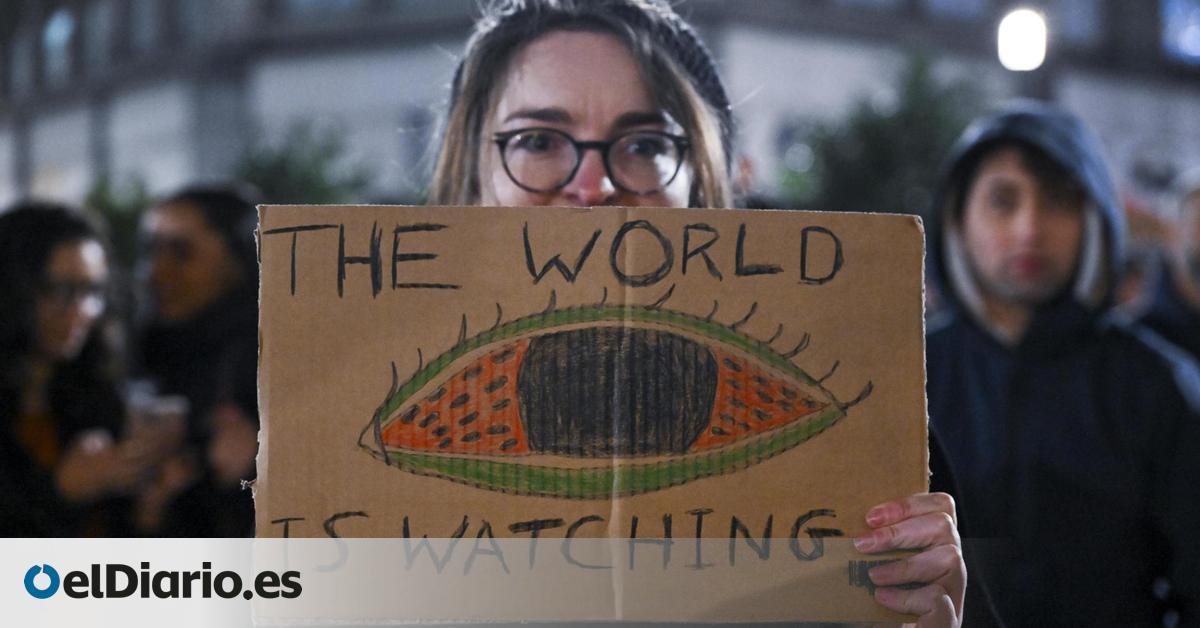
International Justice has taken only two weeks to respond to South Africa’s request to issue precautionary measures to prevent the “genocide” in Gaza, although the decision adopted this Friday by the International Court of Justice (ICJ) has not completely satisfied even the African country or a part of the international community, which expected the highest UN court to impose a ceasefire in the Strip.
The court based in The Hague has accepted the lawsuit filed by Pretoria against Israel for genocide and has declared itself competent to try the case, although it will take much longer for it to issue a final ruling and – as it has admitted in its ruling – “The catastrophic humanitarian situation in the Gaza Strip is at risk of deteriorating further” before that time comes. For this reason, the ICJ has ruled on a series of precautionary measures to protect the population of Gaza until then, after recognizing their right to be protected from “acts of genocide.”
The ICJ has asked Israel to “take all measures in its power to prevent acts” typified in the Convention on the Prevention and Punishment of Genocide, a text on which South Africa based its claim, alleging that Israel has failed to comply with it in the course of its offensive against Gaza – which has left more than 26,000 Palestinians dead, according to data from local authorities, which the UN accepts as valid.
A “victory for justice”
“It is a victory for international law, for human rights and, above all, for justice,” said South African President Cyril Ramaphosa on Friday, whose country has won the sympathy not only of the Palestinians but of many. others who see the historic case against Israel within the framework of a broader fight against oppression and racism. The president welcomed the court’s decision and stressed that it is binding on Israel: “We hope that Israel, as a self-proclaimed democracy that respects the rule of law, complies with the measures ordered by the ICJ.”
“Today Israel is facing the international community. “His crimes against the Palestinians have been exposed,” Ramaphosa said. “We have called Israel’s attacks on Gaza genocidal acts, acts for which Israel must be held accountable. Today the ICJ has agreed with us.”
For Sonia Boulos, a professor at the Antonio de Nebrija University and an expert in international law, the court’s decision lays the groundwork to go further: “First of all, ordering provisional measures means that framing the current violence in Gaza as a genocide is legally possible on the basis of the still partial evidence that exists on the ground.” She explains to elDiario.es that she would also “put Israel’s actions under the scrutiny of the court and the international community, especially in relation to the provision of basic services and humanitarian assistance.” And in the case of Israel’s allies, “it can be argued that member states of the Genocide Convention have an obligation not to sell weapons to a country that is ordered by the ICJ to refrain from acts or to prevent acts that could equivalent to genocide.” That could especially affect the United States, which supplies around 95% of the weapons Israel receives from abroad.
Washington es in fact the main obstacle for the ruling to be applied to its final consequences, as pointed out by the lawyer, who has practiced in the Civil Rights Association in Israel: “The provisional measures are legally binding, which means that the Security Council [de la ONU] can intervene to ensure compliance. However, politically speaking, this option is not feasible since the United States and other permanent members can use their veto power.” Since the beginning of the war in Gaza, the executive body of the United Nations has not been able to approve a strong resolution demanding a ceasefire precisely because of the veto of the United States, which has continued to protect Israel unconditionally in all international organizations.
Israel will continue its offensive
Proof of this is that, this Friday, the Joe Biden Administration has once again defended Israel: “We continue to believe that the accusations of genocide are unfounded and we want to emphasize that the court did not reach any conclusion on genocide nor did it request any ceasefire,” said a State Department spokesperson quoted by Agencia EFE. Showing his appreciation for the ICJ’s decision, the spokesperson assured that he is “consistent” with the US position that Israel “has the right” to act so that the Hamas attacks of October 7 “are not repeated.” ”. He also highlighted that the court has requested the “immediate and unconditional release” of all the hostages who were kidnapped that day by Palestinian militiamen in the towns near the Gaza Strip, one of the priorities for Washington because among them were several Israelis. Americans.
The spokesperson recalled that the US had already asked Israel to “take all possible measures to minimize harm to civilians and increase the flow of humanitarian assistance,” just as the ICJ has done.
For its part, Israel has already responded defiantly to the highest international court, ensuring that it will continue its offensive in Gaza until “absolute victory.” “We are going to continue to do whatever is necessary to defend our country and our people,” said Prime Minister Benjamin Netanyahu on Friday, who celebrated that the ICJ has recognized Israel’s right to defend itself. However, Netanyahu rejected the use of the word “genocide”: “The simple assertion that Israel is committing genocide against the Palestinians is not only false but outrageous, and the court’s willingness to discuss it is a mark of shame that does not exist.” It will be erased for generations.”
From Tel Aviv University, Buchmann Faculty of Law professor Aeyal Gross tells elDiario.es that he does not believe that Israel chooses to ignore the ICJ ruling. “You can say that you already comply with everything you have asked of him (for example, allowing access for humanitarian aid), demonstrate that you do so, and, within a month, report on it” in the report that the court requires him to submit to you. . And, in the event that it does not comply with the provisions of the ICJ, Gross considers that it does not have many options: “The Security Council in theory can try to impose it, but taking into account the US veto, I doubt that will happen.”
“The question is whether this will help in any way change the reality on the ground. The horrible humanitarian situation described by the ICJ must end and it seems that this is the court’s objective,” explains the international law expert, who reiterates that Israel can say that it does “everything in its power” to limit the impact. of war on the civilian population.

In reaching its decision, the ICJ has taken into account the statements of several senior UN representatives on the dramatic humanitarian situation in Gaza, from the collapse of the health system to the enormous destruction and massive displacement of civilians. The president of the ICJ, Joan Donoghue, who was in charge of announcing the verdict, has read those statements and the data collected by United Nations agencies on living conditions in the Strip.
What will the international community do?
Although the ICJ ruling did not include the expected ceasefire, the Palestinians welcomed the verdict, which confirms that “no state is above the law,” according to a statement issued from the headquarters of the Government. Palestinian in Ramallah. “This decision puts an end to Israel’s culture of crime and impunity, present in decades of occupation, ethnic cleansing, persecution and apartheid.” Furthermore, Palestine has called “on the governments of the world to commit to not being complicit in acts of genocide and to work to stop supplying weapons to Israel,” stressing that “they are obliged to do so.”
The Hamas movement, which has ruled the Gaza Strip since 2007, has also asked the international community to “force the enemy to implement the court’s decisions and stop the current crime of genocide against the Palestinian people.” The Islamist group has interpreted that the ICJ decision entails “stopping all forms of aggression against our Palestinian people in Gaza,” although the cessation of hostilities is not included in the provisional measures ordered by the court.
South Africa, the Palestinians and the UN itself point to the international community as the only guarantor that Israel complies with the orders of the ICJ, revealing their distrust that the Jewish State does so of its own volition. From New York, the spokesman for the Secretary General of the United Nations, Stéphane Dujarric, recalled that “the court’s decisions are binding” and stated that Antonio Guterres “trusts that all parties will comply with the court’s order.” “In accordance with the court’s statute, the Secretary General will quickly communicate the precautionary measures ordered by the court to the Security Council,” he reported.
The ball is now in the court of the most influential countries, both within the Security Council and those that can exert pressure on Israel, whether diplomatic, economic or military – without going any further, suspending the shipment of weapons and ammunition. necessary to continue the offensive against Gaza. The European Union, in its first reaction, has distanced itself and has limited itself to saying that it “expects total, immediate and effective compliance” with the ICJ orders.
We take note of today’s order of the @CIJ_ICJ on South Africa’s request for the indication of provisional measures.
The EU reaffirms its continuing support to the International Court of Justice, the principal judicial organ of the United Nations.
Orders of the International… pic.twitter.com/vxQk2iXCYl
— European Commission (@EU_Commission) January 26, 2024
Source: www.eldiario.es

